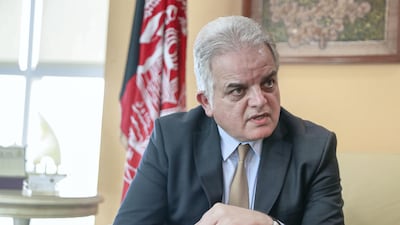Afghanistan’s ambassador to the UAE said his country’s presidential election on Saturday will be crucial to maintaining a legitimate government in Kabul and resuming talks with the Taliban.
Despite deadly Taliban attacks and allegations of fraud, Abdul Farid Zikria told The National that any delay would have strengthened the hand of the militants.
Talks between the Taliban and the US collapsed at the last minute on September 8. The militant group has waged a devastating guerrilla war since it was toppled three months after the September 11 attacks on the US.
Washington excluded the Afghan government from the talks and did not encourage elections, hoping for an interim government that would include the Taliban and take over after a peace deal was signed.
“As soon as you postpone the elections the legitimacy of this government ends,” Mr Zikria said. "There has to be a legitimate government in Kabul to produce peace talks with the Taliban."
Afghan democracy teetered on the brink of collapse after fraud almost ruined the last election in 2014.
The US intervened to broker a power-sharing arrangement under which Ashraf Ghani became President and Dr Abdullah Abdullah, his main rival, was given the new title of Chief Executive. The two are among 16 candidates contesting Saturday’s election.
They include former militant Gulbuddin Hekmatyar, whose decision to take part in the democratic process raised hopes that the Taliban would do the same.
The Taliban do not recognise the political system and said they would only talk with the Kabul government after US forces left.
Mr Zikria said expecting the Taliban to honour a pledge to sever their ties with Al Qaeda and other terrorist groups was wishful thinking.
“Even if the Americans resume the talks, at the end of the day the Taliban would have to come and talk peace with the Afghan government,” he said.
Fundamental issues were left out of the talks, he said, which had mainly focused on a US troop withdrawal.
The ambassador said any agreement on the withdrawal of foreign troops must be in exchange for the departure of foreign militias from the Taliban, which he said made up a fifth of their fighters.
Mr Zikria said that among the issues talks with the Taliban must cover were a ceasefire, prisoner exchanges, the status of Afghanistan and preserving the democratic gains enshrined the country’s constitution, particularly freedom of expression.
A nuclear engineer by profession, he is among a group of professionals who returned to their homeland after the Taliban were toppled.
He had worked as a nuclear risk-assessment engineer in the US and is now in his second term as UAE ambassador.
Mr Zikria said it was unrealistic to have expected an end to the war after a few months of talks and that the experience of other countries showed they take far more time.
He said that in Colombia, another country ravaged by the drug trade, it took five years of intensive talks between the government and Farc guerrillas to reach a peace deal.
“Even that, unfortunately, is failing," Mr Zikria said. "In Afghanistan I believe there was mismanagement of the whole process. From the beginning the talks were not designed properly.
A resumption of talks should include the government and put more pressure on the Taliban through Pakistan, he said.
He said regional forces, mainly Saudi Arabia and the UAE, should be included, as well as Japan, the second-largest donor to Afghanistan after Washington.
“After 40 years of continued war, my countrymen and country deserve to have sustainable peace,” Mr Zikria said. “No one can win this war militarily."


